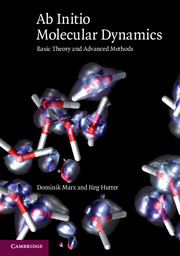Book contents
- Frontmatter
- Contents
- Preface
- 1 Setting the stage: why ab initio molecular dynamics?
- Part I Basic techniques
- Part II Advanced techniques
- 5 Beyond standard ab initio molecular dynamics
- 6 Beyond norm-conserving pseudopotentials
- 7 Computing properties
- 8 Parallel computing
- Part III Applications
- Bibliography
- Index
8 - Parallel computing
Published online by Cambridge University Press: 28 January 2010
- Frontmatter
- Contents
- Preface
- 1 Setting the stage: why ab initio molecular dynamics?
- Part I Basic techniques
- Part II Advanced techniques
- 5 Beyond standard ab initio molecular dynamics
- 6 Beyond norm-conserving pseudopotentials
- 7 Computing properties
- 8 Parallel computing
- Part III Applications
- Bibliography
- Index
Summary
Introduction
Ab initio molecular dynamics calculations call for substantial computer resources. Memory and CPU time requirements make it necessary to run projects on the largest computers available. Today and in the foreseeable future, these high-end resources are provided exclusively by parallel computers. There are many different types of parallel architectures available, differing in their memory access system and their communication system. In addition, widely different performances are seen for the amount of data that can be sent from one processor to another per unit time (bandwidth) and the minimal time needed to send a small message (latency). Further-more, different parallel programming paradigms are supported. In order to have a portable code that can be used on most of the current computer architectures, CPMD was programmed using standard communication libraries and making no assumption about the topology of the processor network and memory access system. Since this approach is also the basis of other general-purpose ab initio molecular dynamics codes, it will serve in this book as the specific case in order to explain in general how to design and code up a highly efficient parallel program.
Minimizing the communication was the major goal in the implementation of the parallel plane wave code in CPMD. Therefore, the algorithms had to be adapted to the distributed data model chosen. The most important decisions concern the data distribution of the largest arrays in the calculation, which are the ones holding information on the wave function, such as e.g. orbital positions and velocities. Several distribution strategies can be envisaged and were used before [189, 190, 240, 274, 1618, 1619].
- Type
- Chapter
- Information
- Ab Initio Molecular DynamicsBasic Theory and Advanced Methods, pp. 350 - 368Publisher: Cambridge University PressPrint publication year: 2009



